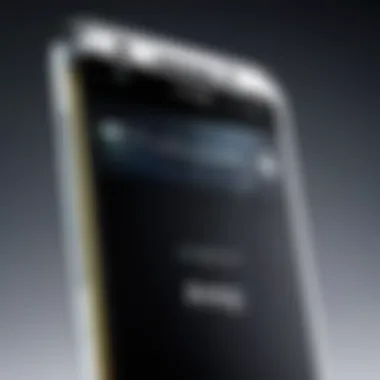Does HTC Still Produce Smartphones in 2023?


Intro
HTC, once a leading innovator in the smartphone landscape, has experienced remarkable fluctuations in its market presence. While this brand was previously synonymous with cutting-edge mobile technology, its position has shifted dramatically over the years. In this analysis, we aim to clarify whether HTC still produces cell phones and what that means for consumers and tech enthusiasts today.
Product Overview
HTC's current offerings in the smartphone arena are limited. The company has shifted focus toward niche products and technology rather than mass-market smartphones. As such, the available products do not compete with the likes of Apple or Samsung effectively anymore.
Specifications
HTC's recent models, such as the HTC U20 5G, showcase decent specifications, including:
- Qualcomm Snapdragon processor
- 6.8-inch display
- Up to 256 GB internal storage
- Versatile camera systems with multiple lenses
These features stand as a reminder of HTC's potential but also highlight its divergence from flagship status that it once held.
Design
Design wise, HTC has maintained its characteristic sleek and minimalist style. The U20 is reasonably ergonomic, though it lacks the premium finish found in competitors’ premium products.
Features
A few standout features in HTC's recent offerings include:
- 5G connectivity, catering to modern demands
- Decent audio performance, a legacy from HTC's focus on audio technology
- Robust build quality, supporting durability
Pricing
Pricing strategies have also been reflective of HTC's repositioning. The U20 5G is priced competitively while targeting mid-range consumers, typically ranging around $500, but this can vary based on the market.
Performance and User Experience
While HTC’s hardware can compete on basic levels, user experience is where the brand needs to improve significantly.
Speed
The processing speed is often adequate for daily tasks but can lag with heavy multitasking. It has become essential for phones to perform seamlessly, especially for their core functions.
Battery Life
Battery life appears respectable, with many users reporting a full day of use under moderate circumstances. However, compared to industry leaders, HTC might seem stagnant in battery technology advancements.
User Interface
The user interface remains somewhat unique, basing itself on Android. However, certain users find it less intuitive when compared to the likes of Google or Samsung's versions.
Customization Options
HTC has provided customization options but seems to has lost the battle of apps with custom skins. The Android system allows for flexibility, but HTC does not emphasize this aspect as much as competitors do.
Comparison with Similar Products
A direct comparison between HTC’s U20 and offerings from brands like OnePlus or Google reveals distinct differences.


Key Differences
HTC lacks the brand popularity and software support that come with competitors. Features also may fall short in comparison, notably in camera technology and software updates.
Value for Money
In terms of value, HTC appeals primarily to dedicated fans or users seeking a unique alternative. Many can find better specifications at similar or lower price points from other brands.
Expert Recommendations
Best Use Cases
HTC phones can be considered for basic daily tasks such as communication, web browsing, or social media engagement. They are not primarily designed for high-performance gaming or extensive multimedia use.
Target Audience
The target audience seems to be those loyal to the brand or those who value niche aspects, such as audio quality or design.
Final Verdict
HTC still produces cell phones, but the brand's relevance is questionable in a fiercely competitive environment. Consumers looking for cutting-edge performance and features may find greater satisfaction with alternatives. The focus on niches may serve a smaller audience but remains a critical part of HTC’s identity.
Prelims to HTC's Mobile Division
HTC's mobile division holds significant importance in understanding the trajectory of mobile technology over the last two decades. It serves as a reflection of shifting consumer preferences, competitive strategies, and technological advancements. A firm grasp of HTC's origins and its remarkable milestones provides essential context to evaluate its current market position and viability. Moreover, it underscores how a once-prominent player navigates the complexities of an industry characterized by rapid changes.
By examining this division, one gains insights into HTC's resilience and adaptability. It also raises critical questions about its relevance in an era where new contenders constantly emerge. When analyzing HTC, one must consider how its historical context influences both present offerings and future prospects. In this article, we will explore these facets thoroughly, beginning with an overview of HTC's origins, followed by a discussion on its significant milestones.
Overview of HTC's Origins
HTC, or High Tech Computer Corporation, began its journey in 1997 in Taiwan. Initially, it manufactured laptops and other handheld devices for various brands, showcasing a keen ability in hardware design. This foundational experience set the stage for HTC's innovations that would later revolutionize the smartphone market. The company's early entry into the telecommunications field helped it hone its skills in wireless technology, ultimately leading to numerous breakthroughs.
HTC released its first smartphone, the HTC Dream, in 2008. This move marked a turning point, as it was the first device powered by Android operating system. With substantial backing from Google, HTC leaned into its expertise to help define the landscape for Android smartphones. Over time, it captured market share, becoming synonymous with high-quality, cutting-edge mobile technology.
Significant Milestones in HTC's History
HTC's trajectory consists of various key milestones that reflect both its ambitious vision and challenges.
- 2008: HTC releases the Dream, the first Android phone, paving the way for future Android devices.
- 2011: The company sees peak success as it emerges as one of the top smartphone makers globally.
- 2013: HTC launches the One (M7), receiving accolades for its design and camera technology, reinforcing the brand's innovative image.
- 2018: The announcement to focus on other technologies marks a strategic shift as mobile sales decline.
These milestones not only chart HTC's growth and prominence but also highlight the critical junctures that significantly impacted its standing in the rapidly evolving mobile market. Understanding these points is vital to frame HTC's current efforts and challenges in maintaining relevancy among competitors.
Current Product Portfolio
The analysis of HTC's current product portfolio is vital to understanding the company's place in the smartphone market today. This portfolio reveals whether HTC continues to serve mobile consumers meaningfully or if it has shifted its focus to other technologies. The importance lies in examining specific elements, benefits, and considerations that define HTC's offerings now.
Overview of Current HTC Smartphones
HTC's current smartphone lineup reflects a strategic decision to cater to niche markets. Recent models, such as the HTC Desire 22 Pro and HTC U20 5G, illustrate this shift. The Desire 22 Pro, for instance, is notable for its integration with blockchain technology, positioning it uniquely within an evolving consumer base. Despite limited volume in comparison with massive competitors like Samsung and Apple, HTC maintains a commitment to quality and innovation in design.
Key characteristics of these models include:
- Distinctive Design: HTC smartphones often feature an elegant aesthetic.
- Focused Functionality: The devices aim to meet specific consumer demands, such as enhanced camera capabilities or long battery life.
- User Experience: HTC has continually emphasized smooth user interfaces and performance.


Analysis of HTC's Features and Innovations
HTC's innovation remains crucial even with a smaller market share. The company has placed emphasis on several features that set it apart from competitors. Among these innovations are advanced camera technologies, significant battery efficiency, and immersive audio solutions. For example, the HTC smartphones often come with a robust audio output, thanks to BoomSound technology, delivering an enhanced listening experience.
Furthermore, HTC's exploration of virtual reality technology translates into unique features that appeal to tech enthusiasts. The integration with the Vive ecosystem allows consumers an innovative way to interact with content. This dedication to pushing technological boundaries is a core aspect of HTC's identity, even as the mobile phone landscape has changed drastically.
Comparison with Previous Models
HTC's evolution is notable when comparing current models with their predecessors. Older HTC devices, like the HTC One M8, were celebrated for their premium build and class-leading camera capabilities. While modern devices may not have the same flagship status as in their prime, they feature enhancements that reflect contemporary demands.
- Camera Enhancements: Modern models show continuous improvements in low-light photography and AI-based enhancements, which were less prevalent in older versions.
- Software Optimization: HTC's UI is streamlined compared to earlier versions, aligning more closely with user expectations of speed and efficiency.
- Diversification: The shift from a wide range of models to a compact selection indicates a strategic adjustment to focus on specialized needs.
In summary, HTC's current product portfolio showcases its resilience and agility in a challenging smartphone market. By honing in on specific features and adapting to consumer demands, HTC is attempting to carve out a more sustainable niche in an increasingly competitive landscape.
Shift in Market Strategy
The shift in market strategy is a critical aspect of understanding HTC's current positioning in the mobile phone industry. This transition reflects the company's response to changing consumer preferences, market dynamics, and technological advancements. By adapting its approach, HTC hopes to carve out a niche in a competitive landscape that has been dominated by giants like Apple and Samsung. The realignment not only signifies a change in product focus but also impacts HTC's branding, consumer engagement, and long-term sustainability.
HTC's Transition to Other Technologies
HTC has undergone a notable transition away from conventional smartphone production. This decision stems from years of declining market share and profitability. With increasing competition, particularly in the mid-range segment, HTC strategically began to explore alternative technology sectors. Notably, HTC ventured into creating components for virtual reality systems and engaged in projects in blockchain technology.
By pivoting towards these new technologies, HTC aims to leverage its engineering expertise. The company's development of the Vive line of virtual reality headsets reflects its commitment to innovate beyond smartphones. The effects of this shift are significant. It positions HTC as a multi-faceted technology provider rather than solely a smartphone manufacturer.
This transition is not merely a reaction to market pressure, but a calculated move to build on HTC's historical strengths in design and hardware prowess. By focusing on virtual reality and blockchain, HTC seeks to tap into emerging markets that carry growth potential.
Focus on Virtual Reality and Blockchain
HTC's focus on virtual reality technology is an integral part of its corporate strategy. The HTC Vive has gained recognition as a leading VR platform, attracting gamers and professionals alike. This line of products has established HTC as a premium player in the VR segment, tailoring to varied applications from gaming to training simulations.
Simultaneously, HTC has also ventured into blockchain. The company introduced the HTC Exodus, a smartphone that integrates with blockchain technology. This innovative product allows users to operate their private keys while enhancing security features. By merging smartphone capabilities with blockchain, HTC is appealing to a niche but growing demographic interested in decentralized technologies.
"HTC's emphasis on VR and blockchain symbolizes a bold attempt to redefine its identity in tech before losing relevance in the smartphone market."
Overall, HTC's shift in market strategy illustrates an ambition to remain relevant in an increasingly complex technology ecosystem. By investing in virtual reality and establishing a foothold in blockchain, the company not only diversifies its offerings but also positions itself ahead of industry trends, making HTC a brand to watch.
Market Position and Competition
In the ever-evolving smartphone market, understanding a company's position and competitive landscape is vital for grasping its potential for growth and sustainability. For HTC, its place within this crowded field is not only about the products it offers but also how these products resonate with consumers. This section will highlight key elements regarding HTC's market standing, its major competitors, and the impact these factors have on consumer perception and overall brand value.
HTC's Standing Among Competitors
HTC's journey in the mobile industry has witnessed significant highs and lows. Once considered a leader in innovation, HTC's market share has gradually diminished over time. Today, it faces stiff competition from giants like Samsung, Apple, and emerging brands such as Xiaomi and OnePlus. The smartphone market has evolved into a battleground where both established names and new entrants compete fiercely for consumer attention.
HTC's current market share is reflective of a company struggling to retain relevance. According to industry reports, its share is below 1% globally, which signals a substantial decrease from its peak years. This has prompted the company to focus on niche markets and consider verticals like virtual reality, which resonate better with its technological strengths. The ability to innovate while retaining quality in product offerings may determine HTC's ability to recover lost ground.
Despite the challenges, HTC differentiates itself with features such as a high-quality build and distinct designs. Previous models like the HTC U11 showcased significant strides in camera technology and audio performance. Nevertheless, these features alone may not suffice to reclaim a commanding presence against brands that offer more aggressive marketing and pricing strategies.
Consumer Perception of HTC Products
Consumer perception significantly shapes HTC's prospects in the smartphone market. While HTC maintains a loyal customer base that appreciates its commitment to quality, many consumers have shifted focus to brands that deliver modern features at competitive prices. Often, potential buyers perceive HTC's brand as outdated, associating it with past successes rather than current innovations.
Market surveys indicate that brand loyalty does exist, particularly among early adopters and tech enthusiasts. These users often cite positive experiences related to product quality and unique features. However, the brand lacks sufficient visibility in comparison to its more prominent competitors, which diminishes its impact in consumer decision-making.


To improve perception, HTC must enhance its marketing efforts and widen its product visibility. Managing a robust online presence through platforms such as Reddit and Facebook can help bridge the gap between the brand and potential users. Engaging with tech-savvy individuals and Android users, who are usually the targeted audience, is crucial. Increased engagement can elevate the brand to a more favorable position and invigorate market interest.
In summary, HTC's position in the market reflects both the outcomes of past strategies and the challenges it faces today. Balancing innovation, functional design, and effective marketing could be essential for HTC to renew its competitive edge.
Challenges Facing HTC
The landscape of the smartphone industry is increasingly competitive. HTC, once a dominant player, now faces significant challenges that can impede its ability to regain its former glory. Understanding these challenges is essential to grasp HTC's current situation and future directions. In this section, we will examine two pivotal issues: market saturation and declining sales, along with the difficulties in adapting to rapid technological changes.
Market Saturation and Declining Sales
HTC's decline in the market can largely be attributed to saturation. The smartphone market is overcrowded with numerous manufacturers. Each offers various models with features that often overlap. The competition is fierce, with giants like Apple and Samsung taking the lead. HTC's once-popular flagship models, like the HTC One series, now struggle to maintain market share as consumers increasingly gravitate toward brands perceived as innovators.
The loss in market share is not merely a statistic; it has real implications for HTC. The declining sales figures affect not only the company's profitability but also consumer perception. Enthusiasts and new users may wonder if HTC can provide cutting-edge technology. A steep drop in visibility leads to a vicious cycle where fewer people consider HTC for their next device.
"In an oversaturated market, brand loyalty can evaporate quickly; consumers prefer brands that are visible and constantly evolving."
Adapting to Rapid Technological Changes
Another challenge facing HTC is the need to adapt quickly to technological advancements. The smartphone industry evolves at a breakneck pace. New trends like 5G connectivity, AI integration, and foldable screens demand rapid development cycles. Unfortunately, HTC has been slow to adopt some of these significant innovations. This lag limits its competitiveness.
Moreover, the shift towards software-driven experiences, such as enhanced camera capabilities and unique user interfaces, requires not just hardware updates but also comprehensive software support. HTC has limited resources compared to its larger competitors, making it challenging to keep up.
In summary, HTC faces pressing challenges that include market saturation and the need to rapidly adapt to new technologies. The company's responsiveness to these pressures will ultimately determine its success in revitalizing its brand in the mobile industry.
Future Prospects for HTC
The future for HTC is a significant subject in understanding its relevance in the mobile phone market. Analyzing potential directions for product development and exploring new markets and technologies are crucial. These factors can provide insights into how HTC can navigate its position amidst strong competition and changing consumer preferences.
Potential Directions for Product Development
HTC's innovation in product development will play a central role in its revival. The company has previously excelled in design and user experience, as seen in its flagship models like the HTC One series. Future products may need to embrace trends such as sustainability and modular design.
- Sustainability: This could involve using recycled materials and focusing on energy efficiency to appeal to eco-conscious consumers.
- Smart Features: Integrating artificial intelligence (AI) for enhanced functionality and user experience can attract technology-savvy users.
- 5G Technology: Emphasizing compatibility with 5G networks can provide consumers with faster connectivity, which is increasingly vital in today’s digital landscape.
By harnessing these directions, HTC could effectively compete with rivals like Samsung and Apple. Each of these avenues offers not just a chance to innovate but also a strategy to regain market share.
Exploring New Markets and Technologies
Delving into new markets and technologies can further enhance HTC's prospects. The smartphone industry is rapidly evolving; diversifying beyond traditional cell phones could be a strategic advantage.
- Virtual Reality: HTC has made strides in the virtual reality space with products like the HTC Vive. Expanding this line can promote growth in entertainment and gaming sectors.
- Blockchain Technology: With increasing interest in blockchain applications, HTC’s pursuits like the Exodus phone—a blockchain-enabled device—signal an entry into this emerging market.
- Wearable Technology: Developing wearables or smart devices that complement smartphones may attract a new customer base.
HTC must remain agile, adapting to trends while also pushing boundaries.
Staying ahead in technology trends could help HTC rediscover its competitive edge.
In summary, HTC's future will depend on its ability to innovate and embrace new technologies and markets. As consumer behavior shifts, strategic initiatives in product development and new technological explorations can steer HTC towards a favorable landscape.
Epilogue
The concluding section serves as a crucial element in understanding HTC's current status in the mobile phone industry. It synthesizes the insights presented throughout the article, allowing readers to grasp the broader narrative of HTC's evolution. Moreover, it emphasizes the importance of evaluating HTC not just by its smartphone offerings, but also by how it has adapted to the changing landscape of technology.
Summation of HTC's Current Position
HTC is now a name that resonates with both nostalgia and curiosity. Once a dominant player in the smartphone market, it faced significant challenges. With a plethora of competitors emerging over the years, HTC's market share diminished. Presently, HTC offers a limited range of smartphones, such as the HTC Desire 21 Pro 5G and the HTC Wildfire E3 Lite, which showcase its capability to integrate contemporary features like 5G, vibrant displays, and competent cameras. However, its presence in the market is minimal compared to giants like Samsung and Apple. HTC's focus has shifted towards virtual reality, with products like the Valve Index and HTC Vive. This pivot indicates a solid strategic reorientation but also underlines a stark contrast to its previous stronghold in mobile phones.
Forecasting HTC's Future in Mobile Phones
Looking ahead, the future prospects for HTC in the mobile phone sector remain uncertain. With the rapid evolution of technology, the company must decide whether to double down on smartphone development or continue exploring other realms such as virtual and augmented reality. The potential for future innovations exists, but market conditions are tough. Competitors continue to enhance their offerings exponentially, raising the bar higher for HTC.
To maintain relevance, it's essential for HTC to innovate without compromising quality. Integrating features such as AI, improved battery life, and standout design could recapture consumer interest. Partnership opportunities with software developers and expansion into emerging markets might provide a foothold back into the mobile arena. However, these steps come with risks and require strategic executions. Without a clear vision and commitment, HTC may find it challenging to revive its former glory in the competitive smartphone landscape.







